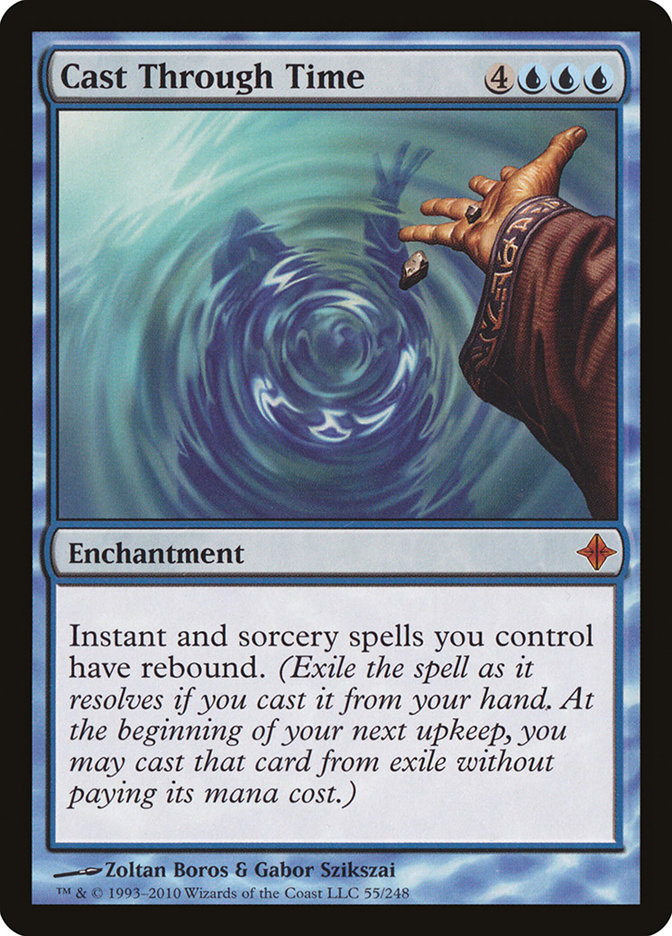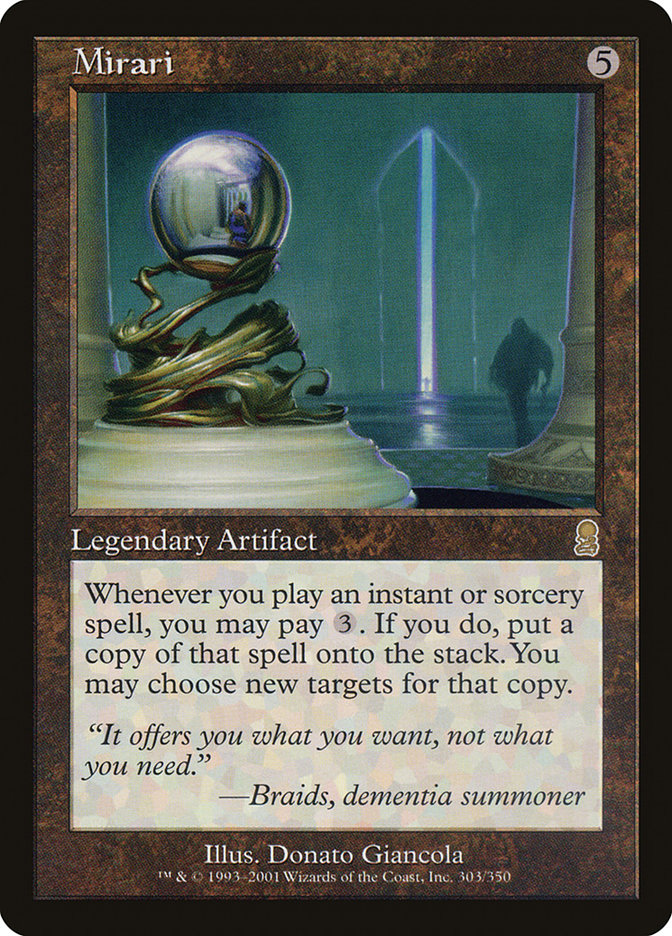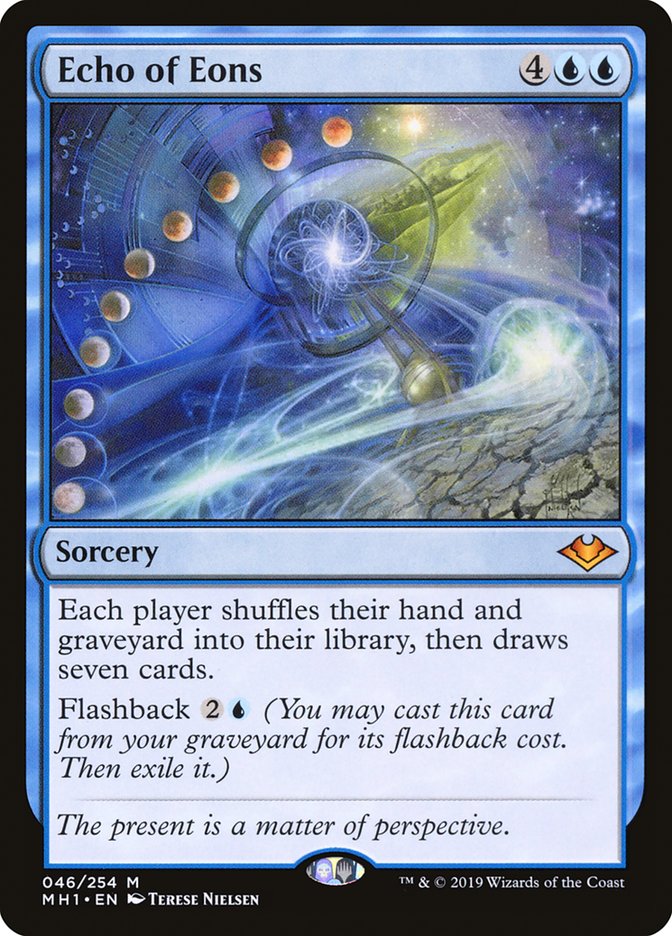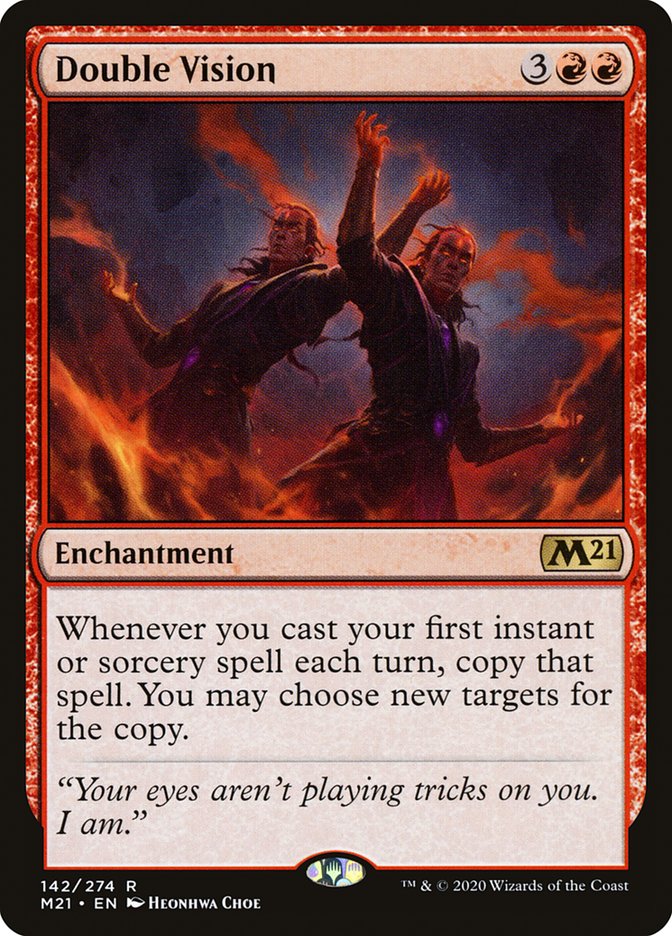Lanzar a través del tiempo Carta MTG
| El coste de maná | |
| Costo de maná convertido | 7 |
| Rareza | Mítica |
| Tipo | Encantamiento |
| Liberado | 2010-04-23 |
| Coleccione símbolo | |
| Coleccione nombre | Rise of the Eldrazi |
| Coleccione código | ROE |
| Número | 55 |
| Frame | 2003 |
| Disposición | Normal |
| Border | Negra |
| Ilustrado por | Zoltan Boros & Gabor Szikszai |
Texto de la carta
Los hechizos instantáneos y conjuros que controlas tienen la habilidad de rebote. (Exilia el hechizo en cuanto se resuelve si lo lanzaste de tu mano. Al comienzo de tu próximo mantenimiento, puedes lanzar esa carta desde el exilio sin pagar su coste de maná.)
Cartas Similares
Cast Through Time se destaca como una carta de encantamiento única en MTG, ofreciendo una capacidad de rastreo de hechizos sin igual a otras cartas en el juego. Comparte el rasgo de copiar hechizos visto en cartas como Mirari, que permite la duplicación de hechizos por un costo adicional de maná. Sin embargo, Cast Through Time otorga esta habilidad de forma gratuita sin costo alguno, para cada hechizo instante y conjuro con reembolso, asegurando que tus hechizos no solo se dupliquen, sino que también regresen para una segunda ronda.
Considerando Echo of Eons, otra carta con un concepto similar de repetición y efecto extendido, su principal ventaja radica en reordenar el cementerio en la biblioteca, refrescando potenciales jugadas. Mientras Echo of Eons reinicia el estado del juego, no ofrece la consistente copia de hechizos que Cast Through Time garantiza turno tras turno. Luego está Double Vision, una carta que copia el primer hechizo instante o conjuro que lances cada turno, pero sin la estructura recurrente del efecto de reembolso encontrado en Cast Through Time. Double Vision crea un impacto inmediato pero carece de la planificación estratégica a largo plazo otorgada por el lanzamiento repetido.
Cast Through Time teje así su propia narrativa al habilitar una profundidad estratégica que fomenta la previsión y el valor continuo, convirtiéndola en una carta con un lugar distintivo y codiciado entre la miríada de hechizos de MTG.
Aspectos positivos de la carta
Ventaja de cartas: Cast Through Time destaca al proporcionar a los jugadores un impulso significativo en la ventaja de cartas. Este encantamiento te permite aprovechar cada hechizo instantáneo en jugadas futuras adicionales al otorgarles rebote. Al lanzar hechizos que ya roban cartas o interrumpen la mano de un oponente, esta carta asegura que puedas hacerlo nuevamente en el próximo turno, duplicando esencialmente tu valor.
Aceleración de recursos: Al habilitar el rebote en hechizos instantáneos, Cast Through Time se puede ver como una forma de aceleración de recursos. Aunque no produce maná directamente ni reduce costos, darle a tus hechizos una segunda vida permite la planificación estratégica y un uso más eficiente de los recursos a lo largo de múltiples turnos, lo que puede darte la ventaja en un enfrentamiento.
Velocidad instantánea: Si bien Cast Through Time en sí no es un instantáneo, potencia tus hechizos a velocidad instantánea, brindándote mayor flexibilidad. Puedes lanzar un instantáneo durante el turno de un oponente, sabiendo que rebotará, y puedes beneficiarte de ese hechizo una vez más en tu próximo turno. Este beneficio recurrente a velocidad instantánea puede interrumpir la estrategia de tu oponente y mantener el tempo sin gasto adicional de cartas.
Aspectos negativos de la carta
Requisito de descarte: Aunque Cast Through Time ofrece un beneficio intrigante al otorgar rebote a tus hechizos instantáneos y de conjuro, no viene sin sus sacrificios. En un entorno de juego acelerado, tener Cast Through Time en tu mano a veces puede equivaler a aferrarte a una carta que podría tener un impacto más inmediato, por lo que puede ser complicado gestionar tu mano cuando tu objetivo es lanzar este hechizo en particular.
Costo específico de maná: Cast Through Time es específico en sus requisitos de maná, exigiendo tres manás azules junto con cuatro manás de cualquier tipo. Esta especificidad puede ser bastante restrictiva, lo que convierte a esta carta en difícil de incorporar en mazos multicolores o en aquellos que no tienen una base sólida de maná azul, lo que potencialmente puede hacer que quede inactiva en tu mano en momentos cruciales.
Costo de maná comparativamente alto: Con un costo de maná total de siete, Cast Through Time se ubica en el extremo superior del espectro. Esto puede ser bastante exigente, especialmente cuando consideras que el juego ofrece otras opciones que podrían proporcionar niveles similares de utilidad o ventaja de cartas a un costo menor. Este alto requisito de maná a menudo puede retrasar tu plan de juego o desviar recursos que podrían asignarse para desarrollar tu presencia en el campo de juego o interrumpir la estrategia de tu oponente.
Razones para incluir en tu colección
Versatilidad: Cast Through Time agrega un valor significativo a los mazos que se centran en instantáneos y conjuros. Permite la recreación instantánea de hechizos poderosos durante turnos posteriores, elevando diversas construcciones estratégicas.
Potencial de combo: Esta carta abre camino a numerosos combos, especialmente en mazos que aprovechan el lanzamiento de hechizos para manipular el flujo del juego. La habilidad de la carta de otorgar rebote a instantáneos y conjuros significa que cada hechizo tiene una segunda oportunidad para causar impacto.
Relevancia en el meta: En un meta donde predominan los mazos de control o estrategias de juego prolongado, Cast Through Time puede proporcionar la ventaja consistente necesaria para superar a oponentes con una corriente de hechizos repetidos e impactantes.
Cómo vencer
Cast Through Time es un encantamiento único que potencia estrategias de instantáneos y conjuros en Magic: The Gathering al otorgarles rebote. Esto significa que cada vez que lanzas un instantáneo o conjuro desde tu mano, infundes al hechizo con una segunda vida, permitiéndote lanzarlo una vez más durante tu próximo mantenimiento sin pagar su costo de maná. Para contrarrestar eficazmente esta carta, los jugadores necesitan implementar tácticas de interrupción que apunten a los encantamientos.
Considera utilizar hechizos de eliminación de encantamientos como Disenchant, Naturalize o Mortify que puedan tratar específicamente con permanentes problemáticos como Cast Through Time. Alternativamente, las cartas que niegan a tu oponente la posibilidad de lanzar hechizos, como Damping Sphere o Rule of Law, también pueden limitar la ventaja proporcionada por Cast Through Time. Un contrahechizo bien cronometrado cuando se lanza Cast Through Time puede prevenir su activación por completo. Utilizar interacciones a velocidad instantánea garantiza que los hechizos de tu oponente, ya sea rebotados o lanzados de forma tradicional, encuentren resistencia.
En esencia, si bien Cast Through Time tiene el potencial de cambiar drásticamente el rumbo de un juego, un mazo equipado con las herramientas de control o interrupción adecuadas puede neutralizar su impacto, manteniendo el equilibrio y colocándote en una mejor posición para asegurar la victoria en el campo de batalla.
Donde comprar
Si estás buscando comprar una carta MTG Lanzar a través del tiempo de un coleccione específico como Rise of the Eldrazi, existen varias opciones confiables que debes considerar. Una de las fuentes principales es tu tienda de juegos local, donde a menudo puedes encontrar paquetes de refuerzo, cartas individuales y mazos preconstruidos de colecciones actuales y pasadas. A menudo ofrecen el beneficio adicional de una comunidad donde puedes intercambiar con otros jugadores.
Para un inventario más amplio, particularmente de colecciones más antiguos, mercados en línea como TCGPlayer, Card Kingdom y Card Market ofrecen amplias selecciones y te permiten buscar cartas de colecciones específicos. Las plataformas de comercio electrónico más grandes como eBay y Amazon también tienen listados de varios vendedores, lo que puede ser un buen lugar para buscar productos sellados y hallazgos raros.
Además, el sitio oficial de Magic suele tener un localizador de tiendas y listas de minoristas para encontrar Wizards of the Productos con licencia costera. Recuerde comprobar la autenticidad y el estado de las cartas al comprarlas, especialmente a vendedores individuales en mercados más grandes.
A continuación se muestra una lista de algunos sitios web de tiendas donde puede comprar las Lanzar a través del tiempo y otras cartas MTG:
 COMPRAR
COMPRAR BurnMana es un socio oficial de TCGPlayer
- eBay
- Card Kingdom
- Card Market
- Star City Games
- CoolStuffInc
- MTG Mint Card
- Hareruya
- Troll and Toad
- ABU Games
- Card Hoarder Magic Online
- MTGO Traders Magic Online
Ver productos MTG
Legalidades
Formatos de Magic the Gathering donde Lanzar a través del tiempo tiene restricciones
| Formato | Legalidad |
|---|---|
| Commander | Legal |
| Legacy | Legal |
| Modern | Legal |
| Oathbreaker | Legal |
| Vintage | Legal |
| Duel | Legal |
| Predh | Legal |
| Penny | Legal |
Reglas e información
La guía de referencia para las reglas de las cartas Lanzar a través del tiempo de Magic: The Gathering proporciona las reglas oficiales, las erratas emitidas, así como un registro de todas las modificaciones funcionales que se han producido.
| Fecha | Texto |
|---|---|
| 15/06/2010 | Al comienzo de tu mantenimiento, se activan todas las habilidades desencadenadas diferidas creadas por efectos de repunte. Puedes manejarlas en cualquier orden. Si deseas lanzar una carta de esta manera, lo haces como parte de la resolución de su habilidad desencadenada diferida. Las restricciones de tiempo basadas en el tipo de carta (si es un conjuro) se ignoran. Otras restricciones no lo son (como la de la Regla de la Ley). |
| 15/06/2010 | Para que ocurra el efecto de rebote, Cast Through Time necesita estar en el campo de batalla cuando el hechizo termine de resolverse. Por ejemplo, si lanzas Warp World desde tu mano, y como parte de su resolución pone Cast Through Time en el campo de batalla, Warp World rebotará. Por el contrario, si Warp World baraja tu Cast Through Time en tu biblioteca como parte de su resolución, y no pone otro en el campo de batalla, no rebotará. |
| 15/06/2010 | Si un efecto de reemplazo hiciera que un hechizo con resurgir que lanzaste desde tu mano se pusiera en otro lugar en vez de tu cementerio (como podría hacer Leyline of the Void), eliges si aplicar el efecto de resurgir o el otro efecto cuando se resuelve el hechizo. |
| 15/06/2010 | Si un hechizo tiene restricciones sobre cuándo puede ser lanzado (por ejemplo, "Lanza -ste hechizo] solo durante el paso de declarar bloqueadores"), esas restricciones pueden impedirte lanzarlo desde el exilio durante tu mantenimiento. |
| 15/06/2010 | Si un hechizo se mueve a otra zona como parte de su resolución (como hacen Arc Blade, All Suns’ Dawn y Beacon of Unrest), el rebote no tendrá oportunidad de aplicarse. |
| 15/06/2010 | Si un hechizo con rebotar que lanzas desde tu mano no se resuelve por alguna razón (por ejemplo, si es contrarrestado por un hechizo como Cancelar, o porque todos sus objetivos son ilegales), el rebotar no tiene efecto. El hechizo simplemente se coloca en tu cementerio. No podrás lanzarlo de nuevo el próximo turno. |
| 15/06/2010 | Si un hechizo que lanzas desde tu mano tiene tanto rebote como recompra (y se pagó el coste de recompra), tú eliges qué efecto aplicar a medida que se resuelve. |
| 15/06/2010 | Si no puedes jugar una carta desde el exilio de esta manera, o decides no hacerlo, no sucede nada cuando se resuelve la habilidad desencadenada retardada. La carta permanece en el exilio por el resto del juego, y no tendrás otra oportunidad de jugar la carta. Lo mismo ocurre si la habilidad es contrarrestada (quizás debido a Estrangular, por ejemplo). |
| 15/06/2010 | Si lanzas una carta desde el exilio de esta manera, irá a tu cementerio cuando se resuelva, falle en resolverse o sea contrarrestada. No volverá al exilio. |
| 15/06/2010 | Si lanzas una carta desde el exilio "sin pagar su coste de maná", no puedes pagar ningún coste alternativo. Cualquier X en el coste de maná será 0. Por otro lado, si la carta tiene costes adicionales opcionales (como kicker o multikicker), puedes pagarlos al lanzar la carta. Si la carta tiene costes adicionales obligatorios (como Momentous Fall), debes pagarlos si eliges lanzar la carta. |
| 15/06/2010 | Si lanzas un hechizo utilizando las habilidades de locura o de diferir, lo estarás lanzando desde el exilio, no desde tu mano. Aunque esos hechizos tendrán rebote, la habilidad no tendrá ningún efecto. |
| 15/06/2010 | Si lanzas un hechizo con rechazo desde cualquier lugar que no sea tu mano (como desde tu cementerio debido a Pecados del pasado, desde tu biblioteca debido a la cascada, o desde la mano de tu oponente debido a los Tripletes de Sen), el rechazo no tendrá ningún efecto. Si lo lanzas desde tu mano, el rechazo funcionará independientemente de si pagaste su coste de maná (por ejemplo, si lo lanzas desde tu mano debido al Arcángel del Maelstrom). |
| 15/06/2010 | Si lanzas un hechizo con repercutir desde tu mano y se resuelve, no se coloca en tu cementerio. Más bien, es exiliado directamente desde la pila. Los efectos que afectan a las cartas que se colocan en tu cementerio no harán nada. |
| 15/06/2010 | Si lanzas un hechizo instantáneo o de conjuro desde tu mano y es exiliado debido a la rebotación, la habilidad desencadenada retardada te permitirá lanzarlo durante tu próximo mantenimiento, incluso si Cast Through Time ya no está en el campo de batalla en ese momento. |
| 15/06/2010 | Las múltiples instancias de rebote en el mismo hechizo son redundantes. |
| 15/06/2010 | Rebote no tendrá efecto en copias de hechizos porque no los lanzas desde tu mano. |
| 15/06/2010 | Del mismo modo, si obtienes el control de un hechizo instantáneo o de conjuro con Comandar, tendrá la recuperación, pero la habilidad no hará nada porque ese hechizo no fue lanzado desde tu mano. |
| 15/06/2010 | El efecto de rebote no es opcional. Cada hechizo instantáneo y de sortilegio que lances desde tu mano es desterrado en lugar de ser puesto en tu cementerio al resolverse, ya sea que lo desees o no. Sin embargo, lanzar el hechizo durante tu próxima fase de mantenimiento sí es opcional. |
| 15/06/2010 | Podrás lanzar un hechizo con sobrescrito de flashback tres veces de esta manera. Primero puedes lanzarlo desde tu mano. Será exiliado debido al rebote al resolverse. Luego puedes lanzarlo desde el exilio debido a la habilidad desencadenada tardía del rebote. Se pondrá en tu cementerio al resolverse. Luego puedes lanzarlo desde tu cementerio debido al flashback. Será exiliado debido al flashback al resolverse. |



